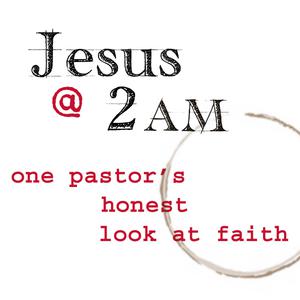
Jesus at 2AM - A Humorous, Intelligent Look at the Bible, Church History & the Life of Faith
Kirk Winslow | Canvas | Irvine, CA) ( (Kirk Winslow | Canvas | Irvine, CA)
...one pastor's honest reflections on the Christian life...
- 43 minutes 37 secondsJesus and the Revolution, Part 03 - The Enemy and the Allure of Now
The divine rescue - of which the ministry of Jesus is the decisive act - is not merely to be understood as the securing of a heavenly afterlife for the faithful, but the restoration of a fallen creation. To be "saved" is to be set free, to be healed and to be counted a citizen of the "kingdom of God."
But such freedom recognizes there we are presently captives, subjects of a hostile regime. There is an enemy that must be defeated. But identifying that enemy - the actual enemy - can be quite difficult.
In this episode we turn to the story of Jesus's "temptation" in the wilderness as Matthew helps us see that this is Evil's attempt at a negotiated victory. Why not accept some comfort here, some glory there and a whole lot of earthly power? All that is required is to let Evil continue it's work behind the scenes... It's an offer Jesus managed to refuse..., but one we are quite often willing to accept in an instant. And the thing about deals with the devil is...there is never a deal.
It can help to follow along visually, so the text for this sermon can be found here --> Matthew 4:1-11 (NRSV)
If you value the podcast and are able to support the community from which it comes, you can make a tax-deductible contribution to Canvas Presbyterian Church here! (Thank you!!!) For more series, resources and means of contacting me, simply head to jesusat2am.com or send me email here!
20 June 2022, 12:15 pm - 46 minutes 5 secondsJesus and the Revolution, Part 02 - A Prophet as of OldGod's Revolution to Restore All Creation begins with a cry to all Israel to prepare for war. But not the war Israel expected... For decades tensions with Rome had been growing. Various political and religious sects (think Pharisees, Sadducees, et al.) were staking out their positions in the coming conflict. Swords and spears were beginning to be sharpened.
And at that time, on the banks of the Jordan (the boundry of the promised land), John the Baptist beckoned God's people to "repent!, because the Kingdom of God (the restoration of God's direct reign in creation) has come near." The battle, the rebellion, is about to begin. It is time to choose a side and pledge allegiance to a leader - to the prophet God will send... It can help to follow along visually, so the text for this sermon can be found here --> Matthew 3:1-17 (NRSV)
If you value the podcast and are able to support the community from which it comes, you can make a tax-deductible contribution to Canvas Presbyterian Church here! (Thank you!!!) For more series, resources and means of contacting me, simply head to jesusat2am.com or send me email here!
13 June 2022, 11:30 am - 46 minutes 14 secondsJesus and the Revolution, Part 01 - A Call to Revolution!At the heart of Jesus's ministry is the declaration that "the Kingdom of God has come near!" This is not merely a call for sinners to secure the afterlife, but the announcement that the fulfillment of the covenant of salvation is at hand! The God of Israel has arrived to depose the powers and principalities of this age and re-establish his reign over all creation. In short, the central proclamation of Jesus is a call to recognize - and join! - THE Revolution!
In this new series, we take a detailed look at the Gospel of Matthew to understand the nature of the revolution Jesus has come to lead and what it means to pledge our allegiance to a new king.
The text for this sermon is: Matthew 19:16-22 (NRSV)
And here is a link to Cotton Mather's quite distressing book: The Negro Christianized: An Essay to Excite and Assist that Good Work, the Instruction of Negro Servants in Christianity.
If you value the podcast and are able to support the community from which it comes, you can make a tax-deductible contribution to Canvas Presbyterian Church here! (Thank you!!!) For more series, resources and means of contacting me, simply head to jesusat2am.com or send me email here!
5 May 2022, 11:00 am - 42 minutes 1 secondHope in the Time of COVID, Part 19 - Resting for the Kingdom
The one commandment I disregard without a second thought is the one about resting. The irony, of course, is that I often ignore this divine call to honor the sabbath in what feels like the work of the Kingdom. And it has been more clear in the last two years than in most of my lifetime that there is work to be done. It is easy for good people to become overwhelmed with a sense of responsibility.
Yet, the one with the greatest human responsibility of all, made public display of stopping, of resting... So this episode is a look at Jesus's pesonal need for rest, and the reminder (which my recent life shows I have yet to learn!) that we must stop neglecting the work of resting for the Kingdom.
To read along or study further, the biblical text for this conversation can be found here: Mark 6:30-52 (NRSV)
And here is how to connect with Presbyterian Disaster Assistance (PDA) - the global relief agency of the Presbyterian Church USA. They do amazing work! You can also now share in worship with Canvas from anywhere in the world via livestream!!!! We'd love to have you join us!
Want more content from Jesus at 2AM? Check out the website, where you can also learn more about how to become a patron.
Up for connecting??? I'd love to have you send e-mail!
21 April 2022, 11:00 pm - 55 minutes 55 secondsHope in the Time of COVID, Part 18 - The Loving Road to Justice
No, your eyes do not deceive you...the podcast is back! (It never really left, but was definitely on leave of absence for a while...very sorry about that - some of the details are in the intro.) Then it's on to part 18 of our series: Hope in the Time of Covid.
In this episode, we take a look at the difficult-yet-essential truth that the road to justice is paved in love. In this time when historic injustices are being revealed with painful clarity, we understand all the more the impulse of the oppressed to seek justice by means of violence. Even those of us who face little oppression can find ourselves shockingly enraged at minor transgressions against "what is right!" And we reflexively assume the person opposing us is the source of the wrong, our "enemy." If we can overcome them, we can achieve "justice." But that's not how true justice is ever established... And, if you're the type who likes to read along, the biblical text for this conversation can be found here: Ephesians 4:17-5:2 (NRSV)
Did you know you can now share in worship with Canvas from anywhere in the world via livestream? We'd love to have you join us! You can also find a complete Canvas audio archive, links to the Canvas YouTube channel and much more on the Canvas website. And for some very helpful resources on this subject, check out Canvas's Continual Learning series on Racial Justice
Want more content from Jesus at 2AM? Check out the website, where you can also learn more about how to become a patron.
Up for connecting??? I'd love to have you send e-mail!
1 April 2022, 5:08 pm - 50 minutes 52 secondsHope in the Time of COVID, Part 17 - Origin Stories
Does the 21st century nation state of Peru play an essential role in salvation history? Short answer: Of course not. God loves Peruvians! But Peru the cultural/political body is not critical to the plan redemption. So why do many American Christians suspect that the US, as a nation (or a cultural dimension of the nation), is a divinely ordained actor on the stage of cosmic salvation? The (mistaken) answer is located deep in both church and American history, and needs to be corrected for the health of both. If you'd like to follow along with the sermon text, the passage is:
This sermon was preached on July 5, 2020 at Canvas Presbyterian Church (Irvine, CA). If you'd like to share in the whole worship service or find previous sermons, they are available on the Canvas Vimeo page. Or join us via live stream every Sunday morning at 10:30AM (Pacific Time)! For some very helpful resources, here is a link to Canvas's Continual Learning series on Racial Justice
Want more content from Jesus at 2AM? Check out the website, where you can also learn more about how to become a patron.
Up for connecting??? I'd love to have you send e-mail!
29 July 2021, 10:09 pm - 53 minutes 25 secondsHope in the Time of COVID, Part 16 - Admitting the Problem (of Sin)
How do I, as a white, well-educated, heterosexual, Protestant, cis male, who would never knowingly sanction racism of any sort, reflect on "systemic racism"?
For those of us who try hard to so very hard to be good people (defined in no small part by being not-racist!), the phrase can spark a reflexive defensiveness ("Not me!"). Yet the enduring effects of racism in our society are clear on many fronts - from "red lining," to access to education, to criminal sentencing, to... So how do I, as trying-to-be-loving-Jesus-follower, think about my part in the "system"? Might I be an unwitting participant in oppression? Can I even ask myself the question? And what if yes...?
For my part, it has helped greatly to shift the focus a bit from the specific wrong of racism, to the larger category of sin. Do I imagine that as a fallen human, sin has the capacity to distort my sense even of myself, and to inspire a selfishness I of which I might not be aware, a blindness I might unconsciously wish to perpetuate?
For some very helpful resources, here is a link to Canvas's Continual Learning series on Racial Justice And if you'd like to follow along with the sermon text, the passage is:
This sermon was preached on June 28, 2020 at Canvas Presbyterian Church (Irvine, CA). If you'd like to share in the whole worship service or find previous sermons, they are available on the Canvas Vimeo page. Or join us via live stream every Sunday morning at 10:30AM (Pacific Time)!
Want more content from Jesus at 2AM? Check out the website, where you can also learn more about how to become a patron!
Up for connecting??? I'd love to have you send e-mail, or find
19 July 2021, 8:13 pm - 44 minutes 6 secondsHope in the Time of COVID, Part 15 - On Love, Hope and Change
Hope is the belief that things can change for the better. And it is the question the gospel persistently sets before us: Are we naive in thinking that meaningful transformation is possible? And more naive still to believe that love is the means by which such transformation truly occurs?
These questions of hope, love and change are especially pressing as we face afresh the reality of historic racial injustice and ask if and how we can shape a better tomorrow.
Here we look at the story of Nicodemus, a Pharisee confronted with Jesus's insistence that he be "born again from above" - that is to say: to surrender what he thinks he knows, and let God show him what love can do (i.e., radically change a heart!).
Here's the link to Canvas's Continual Learning on Racial Justice
And if you'd like to follow along with the sermon text, the passage is:
This sermon was preached on June 21, 2020 at Canvas Presbyterian Church (Irvine, CA). If you'd like to share in the whole worship service or find previous sermons, they are available on the Canvas Vimeo page. Or join us via live stream every Sunday morning at 10:30AM (Pacific Time)!
Want more content from Jesus at 2AM? Check out the website, where you can also learn more about how to become a patron!
Up for connecting??? I'd love to have you send e-mail, or find
6 July 2021, 10:46 pm - 41 minutes 29 secondsHope in the Time of COVID, Part 14 - What God Wants? Justice, Mercy and Humility!
"How does one appease a deity? Gain a favor? Avert a curse?" Such questions stood at the center of Ancient Near Eastern religion (and of many cultures since...). And thus great effort has been dedicated to rituals and ceremonies and strict adherence to divine instructions.
So what does the God of Israel want from his people? What are our instructions? (And is our purpose to gain a blessing or escape a punishment??)
In this episode we turn to the OT prophet Micah's succinct articulation of God's answer.
If you'd like to follow along, the passage is:
This sermon was preached on June 14, 2020 at Canvas Presbyterian Church (Irvine, CA). If you'd like to share in the whole worship service or find previous sermons, they are available on the Canvas Vimeo page. Or join us via live stream every Sunday morning at 10:30AM (Pacific Time)!
Want more content from Jesus at 2AM? Check out the website, where you can also learn more about how to become a patron!
Up for connecting??? I'd love to have you send e-mail, or find
23 June 2021, 12:49 am - 49 minutes 43 secondsHope in the Time of COVID, Part 13 - Jesus and Divine Justice
As those called to share in God's project of restoration, justice is at the heart of our work.
But what does the Bible mean by "justice"? The term easily conjures feelings and images not shalom (peace), but punishment - that divine justice is defined by the reward of the righteous and the proper condemnation of the wicked. (This is where much of the "law and order" language we hear in connection to politics arises!)
But a closer look reveals God's concern is not judgment but compassion. Above all, to be people of divine justice is to be those who ensure the shalom of the least and lowly...
The racial justice resources mentioned in the intro can be found here.
If you'd like to follow along, the passage is:
This sermon was preached on June 7, 2020 at Canvas Presbyterian Church (Irvine, CA). If you'd like to share in the whole worship service or find previous sermons, they are available on the Canvas Vimeo page. Or join us via live stream every Sunday morning at 10:30AM (Pacific Time)!
Want more content from Jesus at 2AM? Check out the website, where you can also learn more about how to become a patron!
Up for connecting??? I'd love to have you send e-mail, or find Jesus at 2AM on Facebook, Twitter and Instagram.
16 June 2021, 12:15 am - 42 minutes 15 secondsHope in the Time of COVID, Part 12 - Hope and Vision
Essential to the life of faith is recognizing that hope is rooted in reality, in what is actually possible. The gospel has no room for fairy tales or wishful thinking, only for what can be accomplished in this time and place.
And thus the work of maturity is to expand our vision for what is possible with God (short answer: healing, peace and restoration). The difference is subtle, but critical.
In a world that is hurting deeply (and this sermon was preached during the rapidly growing COVID crisis, only days after the death of George Floyd), the way forward is to see, as best we can, the world through Jesus's eyes - to see with compassion all the brokenness of the human condition and the in-our-midst process by which love is transforming the broken. If you'd like to follow along, the passage is:
This sermon was preached on May 31, 2020 at Canvas Presbyterian Church (Irvine, CA). If you'd like to share in the whole worship service or find previous sermons, they are available on the Canvas Vimeo page. Or join us via live stream every Sunday morning at 10:30AM (Pacific Time)!
Want more content from Jesus at 2AM? Check out the website, where you can also learn more about how to become a patron!
Up for connecting??? I'd love to have you send e-mail, or find Jesus at 2AM on Facebook, Twitter and Instagram.
4 June 2021, 10:30 am - More Episodes? Get the App
Your feedback is valuable to us. Should you encounter any bugs, glitches, lack of functionality or other problems, please email us on [email protected] or join Moon.FM Telegram Group where you can talk directly to the dev team who are happy to answer any queries.
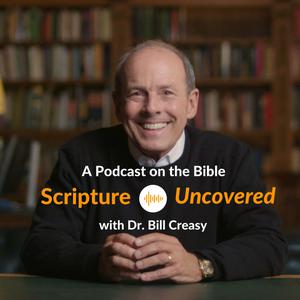 Scripture Uncovered
Scripture Uncovered
 Theology for the Rest of Us
Theology for the Rest of Us
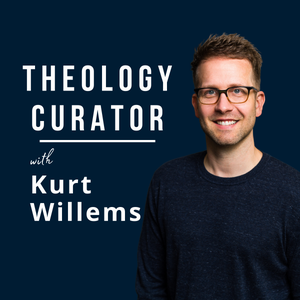 Theology Curator with Kurt Willems
Theology Curator with Kurt Willems
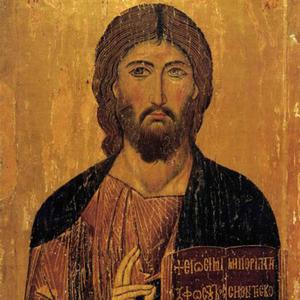 The History of the Christian Church
The History of the Christian Church
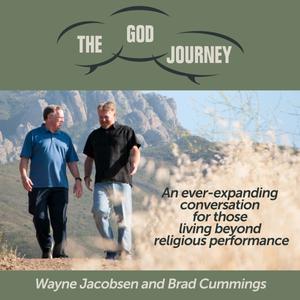 The God Journey
The God Journey
 Seven Minute Seminary
Seven Minute Seminary